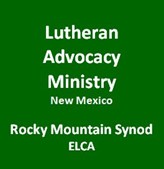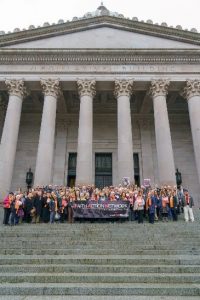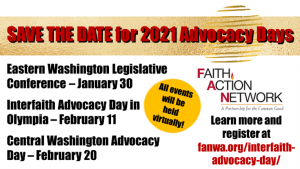Following are updates shared from submissions of the Lutheran Office for World Community and state public policy offices.
As the new year begins, these state public policy offices (SPPO) share their annual policy priorities. Find a map and full list of ELCA affiliated SPPOs using our state office map.
Learn more about Lutheran advocacy using our new resource, Advocacy 101 For Young Adults
U.N. | California | Colorado | Kansas | Minnesota | New Mexico |Pennsylvania | Washington | Wisconsin
United Nations
Dennis Frado, Lutheran Office for World Community, United Nations, New York, N.Y. https://elca.org/lowc
LOWC represents both the ELCA and the Lutheran World Federation (LWF) at UN headquarters in New York. Advocacy through LOWC reflects the work of these bodies depending on whether the context is domestic or international.
United Nations Policy Priorities include:
- Gender Justice– Accelerate the pace towards gender justice, tackle the pervasive gender inequalities and discrimination. Advocate with ecumenical and interfaith partners by urging member states to implement fully the Beijing Platform for Action and other relevant international agreements. Amplify faith perspectives in UN processes, as well as build more coordinated faith interventions for gender justice at the national level.
- Migration– Utilizing a rights-based approach, continue advocating for the promotion and protection of all migrants and their human rights, in accordance with international human rights treaties and instruments. Monitor UN member states implementation, follow up and review of the Global Compact for Safe, Orderly and Regular Migration.
- Humanitarian issues– Advocate for policies that promote and protect humanitarian response efforts by companion churches and organizations, such as the Lutheran World Federation (LWF), through discussions and written messages, when appropriate. Special attention will be given, in conversations with the Security Council member states, to “forgotten crises”. Contact will be maintained with ELCA and LWF staff as well as the UN Office for the Coordination of Humanitarian Affairs and its associated agencies. Advocacy collaboration will take place with ecumenical, inter-faith and other like-minded partners.
- Sustainable Development– Monitor efforts by all relevant UN agencies (including the annual High-Level Political Forum) to achieve Agenda 21 (the Sustainable Development Goals – SDGs) and keep ELCA and LWF colleagues informed about meetings and other advocacy opportunities.
- Human Rights– Advocate for the promotion and protection of human rights in country specific situations as well as with treaty bodies in coordination with LWF staff. Monitor and participate as feasible in the work of the Permanent Forum on Indigenous Issues.
- HIV/AIDS– Continue engaging with faith leaders and communities within the Interfaith platform working towards joint actions for access to prevention, testing and treatment services. Advocate and urge member states to address challenges hindering comprehensive responses to HIV in order to achieve the agenda 2030 HIV-related targets.
- Racial Justice– Continue to advocate for racial justice in UN forums. A planned contribution will be in response to the recent Human Rights Council resolution on policing and racism. Continue to lift up the activities of the UN Working Group on People of African Descent, including the International Day of Remembrance of the Victims of Slavery and the Transatlantic Slave Trade (March 25) and the first International Day for People of African Descent (August 31).
California
Regina Q. Banks, Director – Lutheran Office of Public Policy- California
https://lutheranpublicpolicyca.org/
Issue Priorities for 2021:
- COVID-19 Response and Recovery. The coronavirus and the serious illness it causes have jumped to the fore to impact nearly every aspect of our lives, including state and counties’ Operations, budgeting, workforce, human services, behavioral health, public safety and economic development were all impacted. In 2020, LOPP-CA helped secure important federal CARES Act funding, millions of dollars in state Realignment Backfill funding, and a number of options regarding workforce operations, including increased Mental Health Services Act expenditure authority and extensions for counties. LOPP-CA maintained close engagement with Governor Newsom and his Health and Human Services Agency on the state’s reopening plans, the availability of testing, health equity, and a host of other COVID-19 related issues. As the health crisis continues, we will remain available to respond.
- Affordable Housing. The affordability and availability of housing continues to be at crisis levels in California. The housing issue is not only a crisis in its own right, it’s also a main driver of California’s homelessness emergency. LOPP-CA will advocate for funding for affordable housing, including new state funding for construction of homes affordable to households at all income levels. We will continue to focus on implementation of recent housing legislation, including allocation of approved bonds, as well as full implementation of new homelessness programs.
- Extend the CalEITC and Young Child Tax Credit to immigrant families and communities. These tax credits for families earning low wages are proven to increase economic security in households, help families pay for basic needs such as housing and food, and allow more people to share in the economic prosperity that they help create
Colorado
Peter Severson, Lutheran Advocacy Ministry-Colorado https://www.rmselca.org/advocacy
Lutheran Advocacy Ministry-Colorado has adopted the following policy goals for its 2021 Advocacy Agenda:
- Ending Hunger: improving SNAP usage rates, encouraging greater participation in nutrition programs for children, and collaborating with allied organizations
- Poverty Reduction: supporting implementation work around paid family and medical leave (passed by voters in November as Proposition 118), protecting access to federal programs, and supporting efforts to make the Taxpayer Bill of Rights more equitable
- Access to Housing: expanding and protecting housing options for low-income households (particularly renters) and extending eviction protections during the pandemic, and ensuring robust services and support for people experiencing homelessness
- Criminal Justice Reform: working on sentence commutation and automatic record sealing efforts and advocating for increased community emergency responses from mental health professionals
- Public Health: protecting health care access as a human right and public good, supporting public safety efforts to reduce firearm-involved deaths, promoting opioid addiction care and treatment, and addressing the ongoing mental health impacts of the pandemic (including anxiety, depression, stress, and suicidal ideation)
- Migrants and Refugees: supporting broader ELCA efforts around sanctuary, asylum/refugee and immigration policies in collaboration with Lutheran service agencies
- Caring for Our Environment: addressing the root causes of the climate crisis, supporting incentive-building programs around renewable infrastructure, and addressing the economic implications of transitioning communities away from extractive energy jobs
Kansas
Rabbi Moti Rieber, Executive Director- Kansas Interfaith Action https://www.kansasinterfaithaction.org/
Kansas Interfaith Action (KIFA) is a statewide, faith-based issue advocacy organization that puts faith into action on a variety of racial, economic, and climate justice issues. We are a state public policy office of the Central States Synod of the ELCA. KIFA’s 2021 legislative priorities include:
- COVID-19 relief. People who are suffering from the effects of the pandemic and recession must be protected. In particularly we want to prevent an explosion of homelessness by preventing eviction. The moratorium on utility shut-offs should continue, and in both cases any repayment arrangements should be generous.
- Payday loan reform. KIFA is part of a statewide coalition introducing bipartisan legislation to ease the conditions of short-term, high-interest loans to make them less onerous while protecting the accessibility of short-term credit.
- Medicaid Expansion would help about 165,000 (mostly) working Kansans access affordable healthcare. It would bring millions of dollars in tax money back to the state and help keep rural hospitals open.
- Build economic security for working families through equitable tax and budget policies; improving access to vital family and work support programs; and raising the minimum wage.
- Criminal justice reform. Kansas’s state prisons are overcrowded, with significant racial disparities in enforcement and sentencing. Ways to address these issues include changing the sentencing structure to incorporate treatment, sentencing discretion, elimination of mandatory minimums, restorative justice principles, a focus on reentry, and a focus on decarceration – significantly lowering Kansas’ state prison population through commutations, pardons, and clemency.
- Development of a state energy plan with a goal of equitably decarbonizing our economy by 2050.
KIFA’s advocacy priorities can be found here.
Minnesota
Tammy Walhof, Director- Lutheran Advocacy – Minnesota (LAMN) http://www.lutheranadvocacymn.org/
Issue Priorities for 2021:
COVID/Health Pandemic Aid & Recovery: The Pandemic exacerbates existing disparities as Black, Indigenous, other people of color, and low-income people are made more vulnerable to health and economic impacts. The pandemic also impacts mental health as cases rise and isolation continues.
LAMN is working to address ongoing impacts of the pandemic through policy work in:
- Housing: Emergency Housing Assistance, eviction/foreclosures, shelter capacity
- Mental Health: Accessibility to mental health services
- Anti-Hunger Programs: Broader & deeper access to nutrition programs
- Economic Recovery: Emphasis on income equity and job creation within renewable energy
Affordable Housing: Minnesota faces a severe housing crisis, worsened by the pandemic. The availability of housing, especially affordable housing, is decreasing as bars to low-income homeownership like low income and discrimination increase.
Alongside Homes for All Coalition, our agenda emphasizes the following areas:
- Bonding for more housing stock
- Several Policy Areas/Reforms (eviction reforms, manufactured home parks opportunities for resident community/nonprofit purchase, discrimination, and more)
- Funding, especially for areas of emergency need
Climate Crisis & Clean Energy: A significant rise in climate-related disasters, human displacement, and the risk of future pandemics call for finding new ways to adapt and build resilience. Transition to a Clean Energy Economy has been speeding up. Many new jobs are being created in renewable energy industries. Fossil fuel industry workers need new, just employment.
LAMN is working with the Minnesota Environmental Partnership, the 100 Percent Campaign, and other partners/coalitions to:
- Increase Minnesota’s Renewable Energy Standard
- Require clean energy options to be considered before other energy options
- Ensure a just, equitable transition to renewables for workers and communities
- (Still under consideration) Improve soil health and carbon sequestration through regenerative agriculture
New Mexico
Kurt Rager, Lutheran Advocacy Ministry- New Mexico
https://www.lutheranadvocacynm.org
Dynamic advocacy during the on-going public health emergency:
Since the onset of the pandemic health emergency, state-level advocacy in New Mexico has lived a theme important to the Rocky Mountain Synod, that of “church becoming.” Lutheran Advocacy Ministry – New Mexico (LAM-NM) has repositioned its advocacy awareness and education, congregation outreach, coalition partnerships, and legislative engagement to the variety of virtual formats that so quickly have become our nation’s normal routine. Since the start of the pandemic, the New Mexico State Legislature has held two special sessions during which the capital was closed to the public and most legislators participated from home or office locations via Zoom. New Mexico’s 60-day session, which begins in January will be conducted entirely online and LAM-NM will continue to adapt and find new ways to achieve our advocacy goals in this ever-changing climate.
Since our ministry’s start over 35 years ago, the LAM-NM Policy Committee has helped set our legislative and policy priorities. Due to the significant and on-going presence of hunger and poverty in New Mexico, LAM-NM continues to focus our work primarily on public policies and programs that can have a positive impact on the realities faced by so many. At its 2020 fall meeting, the committee affirmed six priority issue areas on which our 2021 Advocacy Agenda will focus:
- Affordable Housing and Homelessness
- Family-Sustaining Income
- Hunger
- Health Care
- Tax Policy
- Criminal Justice
LAM-NM anticipates adding to the agenda as opportunities arise, particularly in the areas of redistricting, election reform, and racial equity legislation.
Pennsylvania
Tracey DePasquale, Director- Lutheran Advocacy Ministry- Pennsylvania (LAMPa) https://www.lutheranadvocacypa.org/
LAMPa’s 2021 Advocacy Priorities include:
- Ending hunger and poverty and addressing their root causes remain top priorities for Lutheran Advocacy Ministry in Pennsylvania (LAMPa) in 2021. Directing COVID aid to the most vulnerable, preventing homelessness, promoting just and sustainable economic development and achieving equitable education funding are also highlights of the issues agenda approved by LAMPa’s policy council in December. Read more here.
- As the year drew to a close, Lutheran climate advocates testified in support of Pennsylvania’s participation in the Regional Greenhouse Gas Initiative. Read some of their stories here, including that of the Rev. Paul Metzloff of Northeastern Pennsylvania Synod, who testified on behalf of LAMPa.
Washington
Paul Benz and Elise DeGooyer, Faith Action Network https://fanwa.org/
WA State Legislative Session: The 2021 legislative session began on January 11 and goes through April 25. Due to COVID-19, most of the work this year will be virtual, and FAN will continue to advocate strongly for justice-centered bills that support the well-being of our communities and equity for all. The six main areas of our 2021 Legislative Agenda are:
- Advocating for a Biennial Budget that Reflects Our Values as a State

- Reforming our Policing & Criminal Justice Systems
- Creating Housing Opportunities & Preventing Homelessness
- Addressing Climate Change
- Protecting Immigrants, Civil & Human Rights for All
- Ensuring Healthcare & Mental Health Access
You can find our full agenda at fanwa.org/advocacy/legislative-agenda/. We also have a page of Issue Fact Sheets with more information on each bill: fanwa.org/advocacy/issue-fact-sheets/ and a Bill Tracker so advocates can keep up with the progress of bills during the session: fanwa.org/advocacy/bill-tracker/.
 Interfaith Advocacy Days: FAN hosts three Advocacy Days each year. The Eastern WA Legislative Conference “Beyond Words: Doing Justice” will be on Saturday, January 30 and includes a keynote by Rev. Walter Kendricks, a response panel, workshops, and legislative updates. Our annual Interfaith Advocacy Day focused on Olympia is on February 11 and will include information sessions, greetings from elected officials, workshops on bills on our agenda, and legislative district caucuses with legislator appointments on Thursday and Friday. In Central WA, we will gather on February 20 for Advocacy Day, “Moving Past Crisis and Into Action” for a morning of legislative overview, a panel discussion on policies affecting immigrants, and breakout action groups on Poverty, Climate, Voting Rights, Healthcare, and Immigration. We will emphasize collective actions we can take to move the policies forward, both locally and at the state level.
Interfaith Advocacy Days: FAN hosts three Advocacy Days each year. The Eastern WA Legislative Conference “Beyond Words: Doing Justice” will be on Saturday, January 30 and includes a keynote by Rev. Walter Kendricks, a response panel, workshops, and legislative updates. Our annual Interfaith Advocacy Day focused on Olympia is on February 11 and will include information sessions, greetings from elected officials, workshops on bills on our agenda, and legislative district caucuses with legislator appointments on Thursday and Friday. In Central WA, we will gather on February 20 for Advocacy Day, “Moving Past Crisis and Into Action” for a morning of legislative overview, a panel discussion on policies affecting immigrants, and breakout action groups on Poverty, Climate, Voting Rights, Healthcare, and Immigration. We will emphasize collective actions we can take to move the policies forward, both locally and at the state level.
Wisconsin
Cindy Crane, Lutheran Office for Public Policy in Wisconsin (LOPPW) https://www.loppw.org/
LOPPW’s 2021 Advocacy Priorities:
Care for God’s Creation: Wisconsin Faith Coalition for Climate Justice is the name our coalition decided upon. LOPPW organized the group to address climate and water issues in the next State Budget. Our virtual advocacy event will be held on March 18, and we will organize actions leading up to and following the event.
Criminal Justice: Kyle, our hunger advocacy fellow, has worked with Kids Forward to continue leading coalition meetings to advocate returning 17-year-old youth to the juvenile justice system. This is a coalition initiated by LOPPW. Kyle has helped to organize three work groups to meet outside of coalition meetings.
Health: Advocated for the State Legislature to create a plan to address the pandemic. We signed on to a letter initiated by the Wisconsin Catholic Conference to request that clergy be moved up as a priority group to receive vaccinations.
Anti-Racism: Made a National Council of Churches letter Bishop Eaton signed on to requesting the removal of President Trump from office known. We also sent the NCC petition requesting the president’s removal to our listserv.
Wisconsin State Budget and LOPPW’s Priorities:
- LOPPW is working with two coalitions focused on the Wisconsin State Budget. One focuses mainly on hunger, poverty, and immigration issues, and the other on additional issues. We are also working with the Wisconsin Anti-human Trafficking Consortium to strategize addressing budget items and separate proposed legislation.
